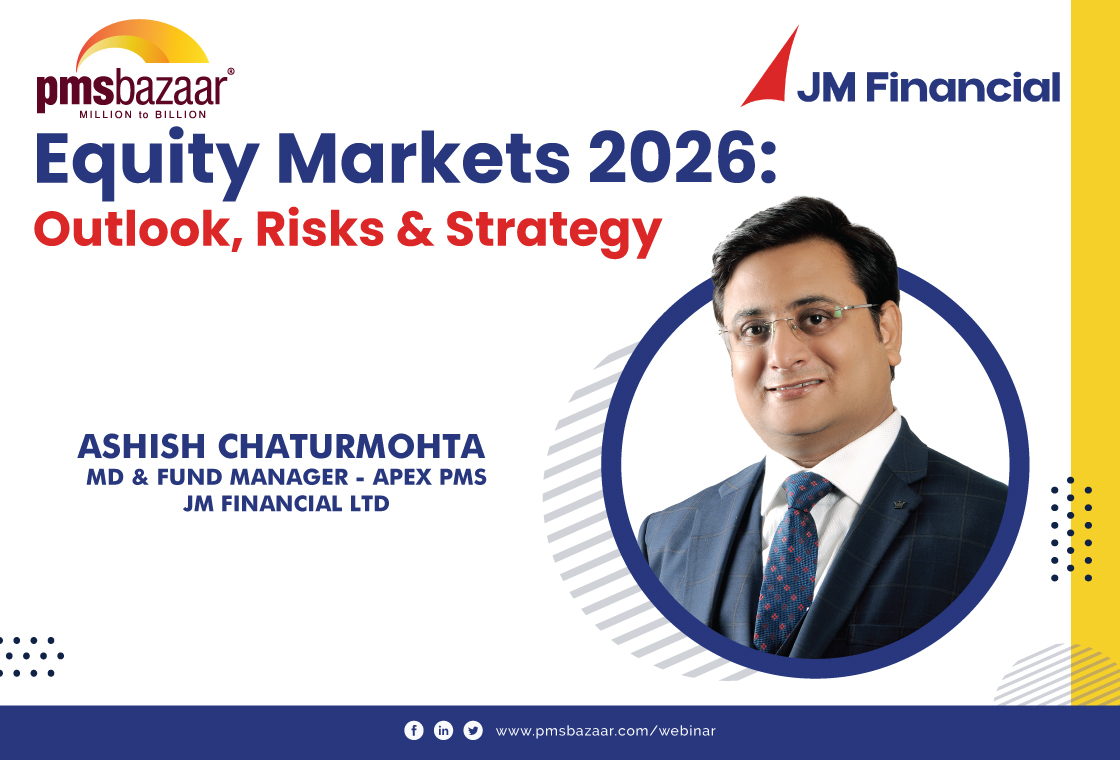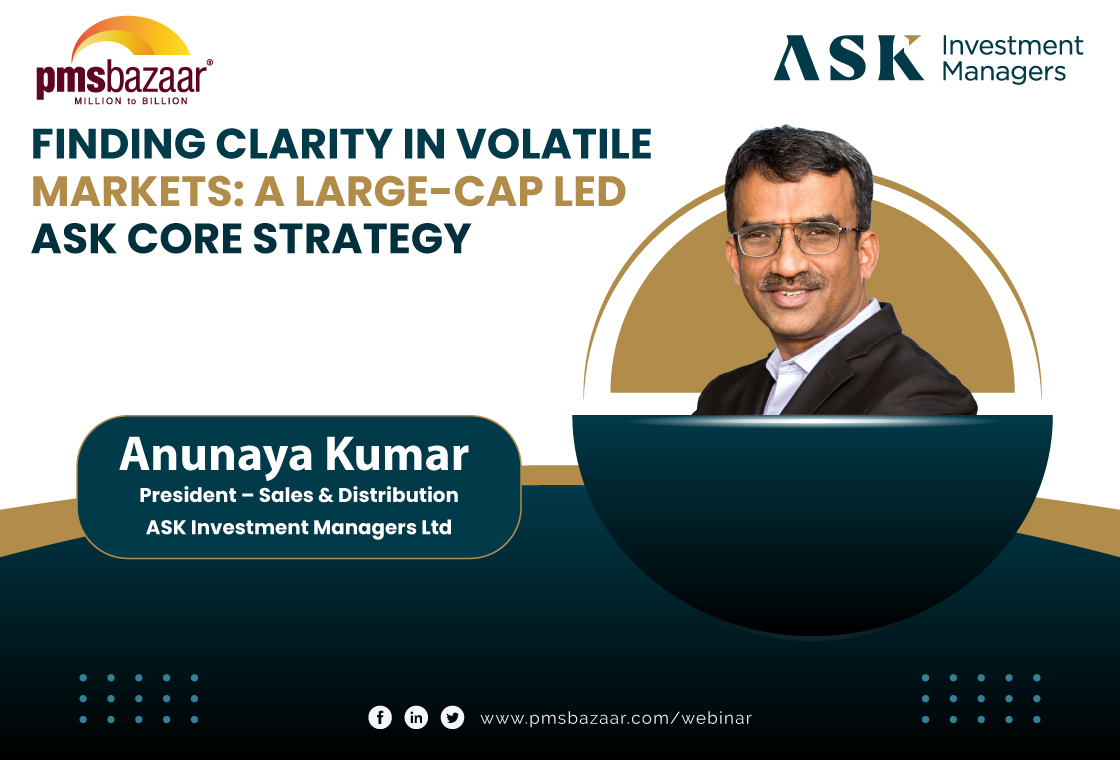As a part of the Alternates Universe Webinar Series, PMS Bazaar, in association with Sundaram Alternates, recently conducted an Exclusive Webinar with Mr. Karan Bhagat, Founder of 360 ONE, as the guest speaker. This session was hosted by Industry Experts - Mr. Vikaas M Sachdeva, Managing Director, and Mr. Madanagopal Ramu, Fund Manager and Head of Portfolio Management Services, from Sundaram Alternates. The discussion revolved around the wealth and asset management sector, delving into the exploration of opportunities and challenges. This Blog covers some of the key excepts from this insightful webinar.

Excerpts from the Webinar
- A journey filled with optimism
- Role of changes and adaptation
- Factors contributing to growth in alternative investments
- Key factors in wealth management and strategic decisions
Journey Filled with Optimism
Mr. Sachdeva initiated the session by inquiring about Mr. Karan's entrepreneurial journey and the decisive moment he ventured into entrepreneurship. After that, he asked how Mr. Karan's journey embodies optimism, even when facing challenges. Lastly, he requested insights into the core vision that drove Mr. Karan to become an entrepreneur.
Mr. Karan responded by saying while he may not have started with a grand vision, one thing was clear: he was driven by the desire to create something meaningful. In the mid-2000s, he came across the concept of a family business thanks to an influential contact. He spent countless nights studying the intricacies of family businesses and how they were evolving, especially in the United States.
The pivotal moment came when Mr. Karan observed Bank of America Merrill Lynch's transition in 2007-08 from a broker-dealer to an advisory role in the US. It struck a chord with him. He saw the potential to offer comprehensive financial advisory services beyond just numbers. He envisioned a platform that would provide holistic wealth management, catering to families, individuals, and businesses' unique needs.
Role of Change and Adaptation
Mr. Sachdeva asked about the role of change in Mr. Karan's entrepreneurial journey. Mr. Karan responded by emphasizing that although initially unwelcome, change can act as a catalyst for growth. He stressed the importance of harnessing adversity to evolve and emerge stronger. According to him, the first minute of adversity may be disheartening, but the subsequent nine minutes present an opportunity to transform challenges into opportunities. It's all about adapting and thriving in an ever-evolving landscape.
Balancing the interests of promoters, employees, and clients is indeed a complex task. It's essential to ensure that everyone's needs are met, even when they appear to be in conflict. This alignment has formed a fundamental part of our culture, shaping our long-term success.
Factors Contributing to Growth in Alternative Investments
Next, Mr. Ramu asked Mr. Karan about his perspective on the factors contributing to growth in alternative investments. Mr. Karan replied that alternatives have become a significant part of India's asset management industry in the last 10-15 years. The growth in alternative investments can be attributed to several factors:
Diversification: Investors increasingly seek diversification beyond traditional asset classes like equities and fixed income. Alternatives offer exposure to a wide range of assets, including real estate, private equity, hedge funds, and infrastructure, providing investors with diversification benefits.
Higher Potential Returns: Alternatives often have the potential for higher returns compared to traditional asset classes. For example, successful private equity and venture capital investments can yield substantial returns.
Risk Mitigation: Alternatives can provide a hedge against market volatility and economic downturns. Investments in assets like real estate and infrastructure tend to be less correlated with stock markets, reducing overall portfolio risk.
Income Generation: Some alternative investments, such as real estate and infrastructure, can provide a steady income stream through rent, dividends, or interest payments.
Innovation in Products: The asset management industry has introduced innovative investment products, such as real estate investment trusts (REITs), infrastructure investment trusts (InvITs), and structured products, to make alternative investments more accessible to retail investors.
Regulatory Changes: This includes the introduction of REITs and InvITs regulations, which have facilitated the growth of alternative investments in India. These regulations have made it easier for investors to participate in real estate and infrastructure projects.
Increased Awareness: Investors are becoming more aware of the benefits of alternative investments and are seeking opportunities beyond traditional avenues. Investment advisors and wealth managers also educate their clients about the advantages of diversifying into alternatives.
Professional Management: The availability of professional asset managers and fund houses specializing in alternative investments has boosted investor confidence in these asset classes.
Tax Efficiency: Certain alternative investments, such as REITs and InvITs, offer tax advantages, making them attractive to investors.
Long-Term Investment Horizon: Many alternative investments have longer investment horizons, aligning with the objectives of institutional investors like pension funds and insurance companies.
Institutional Participation: Institutional investors, including sovereign wealth funds, pension funds, and endowments, have increased their allocation to alternative investments, setting a trend for retail investors to follow.
While alternatives have gained prominence, investors should also be aware of the associated risks, including illiquidity, complexity, and potential for capital loss. Due diligence and a clear understanding of the investment strategy are essential when considering alternative investments. Additionally, investors must align their alternative investments with their overall financial goals and risk tolerance.
Key Factors in Wealth Management and Strategic Decision
Mr. Sachdeva asked Mr. Karan about the factors crucial for wealth management firms to retain assets under management and how to balance the decision between scaling up and maintaining a boutique approach. In response, Mr. Karan mentioned that the strongest relationships, clear communication, consistent performance, and adaptability to changing client needs are vital for asset retention. He emphasized the importance of building trust and demonstrating a deep understanding of clients' financial goals and risk tolerance.
Regarding the strategic level decision, Mr. Karan stated that midsize wealth management firms should consider their growth ambitions carefully. Scaling up may necessitate substantial investments in infrastructure, technology, and talent. On the other hand, maintaining a boutique approach involves optimizing operations, enhancing the client experience, and preserving a strong reputation for delivering value. He advised that the decision should align with the firm's long-term vision, available resources, and the competitive landscape.
The webinar panel discussed all the above-mentioned points and more. Watch the entire session with the appended link below.
Get access to rich data and analytics of PMS & AIF by subscribing to us. Join the 50000+ investors & experts now: Subscribe NOW
Recent Blogs

January Rout, Extreme Dispersion: PMS Returns Swing From Losses to Gains
Benchmark falls deepened losses, but multi-asset and debt cushioned portfolios meaningfully

Investment Frameworks : A Practitioner’s Guide
PMS Bazaar recently organized a webinar titled “Investment Frameworks: A Practitioner’s Guide,” which featured Mr. Sumit Agrawal, Senior Vice President, Nuvama Asset Management Limited. This blog covers the important points shared in this insightful webinar.

Aurum Multiplier Portfolio - Where Small and Mid-Cap Alpha Meets Large-Cap Stability
PMS Bazaar recently organized a webinar titled “Aurum Multiplier Portfolio - Where Small and Mid-Cap Alpha Meets Large-Cap Stability,” which featured Mr. Sandeep Daga, MD& CIO, Nine Rivers Capital and Mr. Kunal Sabnis, Portfolio Manager, Nine Rivers Capital. This blog covers the important points shared in this insightful webinar.

Flat Markets, Wide Outcomes: How 484 PMS Strategies Performed in Dec 2025
December 2025 was a month where market returns stayed close to flat, with the Nifty 50 TRI at -0.28% and the BSE 500 TRI at -0.24%.

Equity Markets 2026: Outlook, Risks and Strategy
PMS Bazaar recently organized a webinar titled “Equity Markets 2026: Outlook, Risks and Strategy,” which featured Mr. Ashish Chaturmohta, MD & Fund Manager – APEX PMS, JM Financial Limited. This blog covers the important points shared in this insightful webinar.

MICRO CAPS: The Dark Horses of the Indian Equity Market
PMS Bazaar recently organized a webinar titled “MICRO CAPS: The Dark Horses of the Indian Equity Market,” which featured Mr. Rishi Agarwal and Mr. Adheesh Kabra, both Co-Founders and Fund Managers, Aarth AIF. This blog covers the important points shared in this insightful webinar.

Finding Clarity in Volatile Markets: A Large-Cap Led ASK CORE Strategy
PMS Bazaar recently organized a webinar titled “Finding Clarity in Volatile Markets: A Large-Cap Led ASK CORE Strategy,” which featured Mr.Anunaya Kumar, President – Sales and Distribution ASK Investment Managers Limited. This blog covers the important points shared in this insightful webinar.
.jpg)
Passively Active Investing — A Modern Investor’s Lens on ETF-Based PMS
PMS Bazaar recently organized a webinar titled “Passively Active Investing — A Modern Investor’s Lens on ETF-Based PMS,” which featured Mr. Karan Bhatia, Co-Founder and Co-Fund Manager , Pricebridge Honeycomb ETF PMs. This blog covers the important points shared in this insightful webinar.

